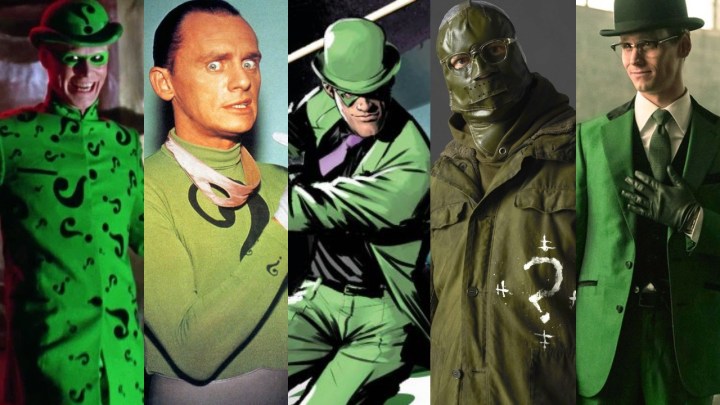Gotham City’s brooding superhero is no stranger to writers and directors diving straight into the dark and gritty tone that’s popularized Batman for decades now. Along the way, the character also developed a reputation in the comic books for having amassed one of the most iconic rogues’ galleries in the genre. Despite his normally over-the-top flamboyant wardrobe and aggravating personality, the Riddler has established himself among the Dark Knight’s A-list tier of supervillains. Taking all the different shades of the character into account from the page to the screen, here’s what fans should know about the conniving Edward E. Nygma before seeing The Batman.
Though director Christopher Nolan’s The Dark Knight Trilogy was widely acclaimed for reinventing the superhero’s dense world and characters in a modern, more grounded setting – and redeeming his theatrical reputation after the maligned mid-to-late-’90s movies – The Batman seems set to do something excitedly different by using similar narrative approaches. Like how Nolan also redeemed Two-Face from Batman Forever’s tonally unfaithful Tommy Lee Jones version, Matt Reeves could be doing the same for that movie’s zany and aggressively silly Jim Carrey take on the Riddler.

Comic book characters as a rule can be open to multiple interpretations while keeping the core of what makes them instantly recognizable. The Riddler has seen such takes in both comics and on screen, ranging from cartoonishly narcissistic to dangerously grim. With Batman and his villains excelling in practically every medium when tackling tightly scaled, gritty stories centered around crime noir, Reeves use of acclaimed indie actor Paul Dano to put a Zodiac-like spin on the Riddler could be the concoction necessary for a successful theatrical redemption.
Inside the mind of an “E. Nygma”
Rampant narcissistic and egomaniacal behavior, an obsessive-compulsive disorder, and a colossal superiority complex are perhaps the biggest defining traits of the Riddler. In the comics, the criminal mastermind is a psychopath who is obsessed with flexing his intellectual dominance over Gotham City, its people, the police, and – most importantly – the Batman himself. Seeing this nocturnal bat-themed vigilante leaping rooftops and upending the villains’ most nefarious plots against Gotham and its citizens makes the Riddler feel compelled to take him down a couple of notches.

His puzzles, riddles, and death games are all unhinged attempts at finally besting the World’s Greatest Detective at his own game – any innocent lives be damned. That’s the core pillar to making an intriguing Edward E. Nygma (or his legal name, Edward Nashton, in The Batman) regardless of the continuity he’s in. However, he’s had some creative tweaks even in comics, with modern interpretations going from the traditional bombastic route to gruesomely bloodthirsty and willing to deal with the supernatural in Batman: Dark Knight, Dark City, to the behind-the-scenes Jigsaw-inspired puppet master in Earth One Volume 2. Nonetheless, these incarnations of the villain, and many in between, all kept that essence of what makes Riddler the Riddler.
Different versions, same riddles
On the screen, the history of the villain is more sporadic. The most notable ones include, of course, Frank Gorshin’s iteration from the campy Adam West days and the aforementioned Jim Carrey version. While the goofy family-comedy atmosphere of the 1960s movie and TV show best encapsulated the Silver Age of comics it debuted in, the desire for that tone had long since passed by the time 1995’s Batman Forever was released – and the even more maligned Batman & Robin can be lumped into that same category.
Jim Carrey’s portrayal, in retrospect, is to be expected out of a movie from the ’90s, but it was the start of the downward spiral that the Batman IP suffered from theatrically. It seemed like an exaggerated alternate riff on Jack Nicholson’s fan-favorite performance from Tim Burton’s Batman in 1989, but offered none of the creativity or surprise. Panned as it was, Carrey’s interpretation of the villain did have at least some semblance of the Riddler buried underneath. Veteran comic book fans might agree on that after seeing writer James Tynion IV’s somewhat recent version of the character in his Batman run with DC.
The other most noteworthy (live-action) portrayal would be Cory Michael Smith’s from the Fox TV show Gotham. The series turned into a “greatest hits” of sorts that showcased Batman’s most infamous rogues, with this Riddler, and the series in general, earning a devoted cult following among fans. Coincidentally, part of the warm reception for this version of Riddler was for his dynamic with Robin Taylor Lord’s equally praised Oswald Cobblepot/the Penguin.

However – like with most things concerning adaptations of the Dark Knight’s storied mythos – the most acclaim the Riddler has had on screen was with the acclaimed 1990s cartoon Batman: The Animated Series. John Glover lent his voice talents to the delightfully insufferable supervillain, which also benefitted from a classy character design that tastefully embraced the comic book aesthetic. This Riddler was suitably cocky and vindictive, but he also had an air of cunning and composure about him.
A new take on a classic character
And after all these variations of the character, Reeves is looking to go in a fairly new direction with him in The Batman. His use of the villain appears to be the culmination of the beloved visions of Batman’s world that started in the early 1970s comics, spearheaded by the late Dennis O’Neil before exploding in the ’80s with Alan Moore, Frank Miller, and Grant Morrison’s comics, as well as Burton’s gothic, stylish movies.

Riddler’s aforementioned Zodiac Killer makeover for The Batman seems to suit Paul Dano’s acting talents, as he’s been known to have incredible range. Most relevantly, this includes portrayals as disturbed and/or morally bankrupt characters like Paul/Eli Sunday in Paul Thomas Anderson’s There Will Be Blood, the slave owner John Tibeats in Steve McQueen’s resonant 12 Years a Slave, and Alex Jones in Dennis Villeneuve’s haunting crime-thriller Prisoners.
The Riddler has been long overdue for a big-screen, live-action redemption. In the best of the Dark Knight’s comic book catalog, he’s provided the superhero with compelling mental obstacles that have frequently stumped one of the most intelligent characters in comic books. As simultaneously oversaturated and engrossingly iconic as the Joker is, what Reeves seems to be putting together in The Batman is a detective-oriented mystery-thriller that veteran DC fans have been hoping to see, theatrically, for decades. The Clown Prince of Crime challenges Batman on a philosophical level and incites his rage (to kill, or not to kill?), while the Riddler challenges him on an intellectual level that no other villain can quite match.
After all, Batman debuted in Detective Comics back in 1939, and acclaimed comics like The Long Halloween and Dark Victory home in on the aforementioned “World’s Greatest Detective” element in a way no live-action film has yet to do … until now.
Laying down a foundation for the future
Should behind-the-scenes rumblings turn out to be true, Reeves could be in for a full-blown Bat-verse. This wouldn’t come as a surprise (especially seeing the glowing reception for his movie so far) since there are already two live-action TV spinoffs in the works at HBO Max in the forms of a Gothan City Police Department prequel and a Colin Farrell-led Penguin series.
But what does Riddler have to do with all this in the grand scheme of things? For one, The Batman could end up being the fullest embrace of this world’s pulpy crime-noir roots on the big screen, and the Riddler grounding the psychologically tumultuous hero in a grisly detective-thriller would be the catalyst for this universe’s atmosphere going forward. A prospective trilogy of films helmed by Reeves could further open up the mainstream audience to the comic book spirit of The Batman while – hopefully – standing on its own two feet at the same time.
However, even with all these terms like “grounded,” “gritty,” and “dark” being thrown around, it shouldn’t discourage fans hoping to see something more fantastical down the line. Some of the early responses praised Paul Dano’s eerie portrayal of the Riddler, and that potential creativity could pay it forward to other beloved villains that have an inherent sense of comic book craziness. Further credence is lent to this possibility when considering Reeves’ excellent character-driven writing and direction of Andy Serkis’ Caesar in Dawn of the Planet of the Apes and War for the Planet of the Apes.
So while it’s still a bit early for fans to start campaigning for the likes of Man-Bat in some sort of Batman horror-thriller, as incredible as that sounds, others are ripe for the turnaround they’ve long been denied (i.e., Mr. Freeze, who suffered greatly with Arnold Schwarzenegger’s pun-happy performance in Batman & Robin). If The Batman is the blueprint for how the Dark Knight’s rogues’ gallery will be treated in the future, both comic book fans and casual moviegoers are in for a treat.



